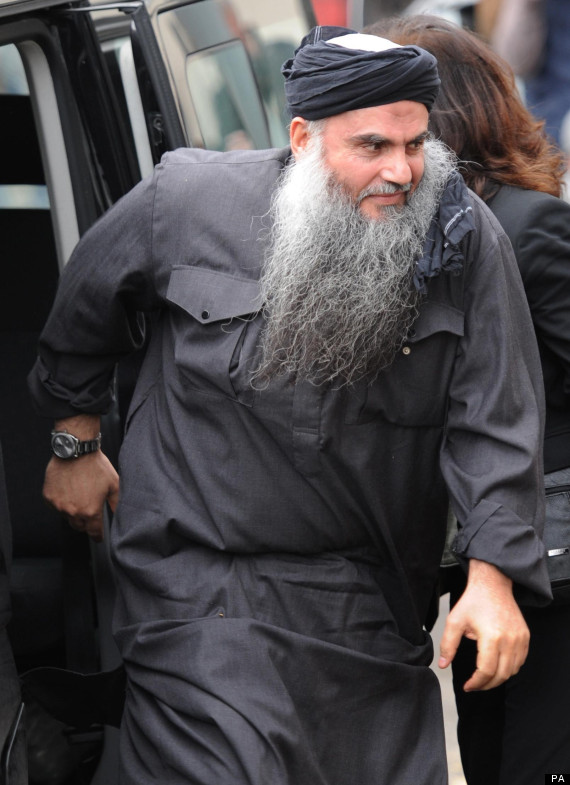The Government has been refused permission to take to the Supreme Court its fight to remove preacher Abu Qatada from the UK, the Judicial Office has said.
Permission to appeal to the Supreme Court was refused by the Court of Appeal.
The government's latest move came after judges last month rejected the latest in a long line of attempts to deport the terror suspect to Jordan.
A Home Office spokesman said they were "disappointed with the Court of Appeal's decision" but would be requesting permission to appeal directly from the Supreme Court.
"The Government remains committed to deporting this dangerous man and we continue to work with the Jordanians to address the outstanding legal issues preventing deportation," they said.
In March, the Court of Appeal backed an earlier ruling that Qatada, also known as Omar Othman, could not be deported over fears that evidence obtained through torture would be used against him.
At the same time, he was re-arrested for being linked to the publication of extremist material.
A spokesman for the Judicial Office said the Court of Appeal had confirmed that that it had refused permission for the Home Secretary, Theresa May, to appeal to the Supreme Court.
Theresa May's lawyers had previously challenged a ruling made last November by immigration judges on the grounds that Qatada was a "truly dangerous" individual who had escaped deportation through "errors of law".
But three appeal judges said the Special Immigration Appeals Commission (Siac) was entitled to conclude that disputed statements will be used against Qatada.
Qatada, who featured in hate sermons found on videos in the flat of one of the 9/11 bombers, has ultimately thwarted every attempt by the Government to put him on a plane.
A resident in the UK since September 1993, he was returned to jail last month after he was arrested for alleged bail breaches.
A hearing over whether he should be granted bail again was due to be held last month, but was delayed.
Police searched Qatada's family home in London before he was held and have since said that he is being investigated over extremist material.
The case is still open to the government to apply directly to the Supreme Court in a bid to take the case further.
The normal process is to submit a permission to appeal application which would then be considered by three Supreme Court justices.
They would decide whether or not the application raised a point of law of general public importance.
Original Article
Source: huffingtonpost.co.uk
Author: PA/The Huffington Post UK
Permission to appeal to the Supreme Court was refused by the Court of Appeal.
The government's latest move came after judges last month rejected the latest in a long line of attempts to deport the terror suspect to Jordan.
A Home Office spokesman said they were "disappointed with the Court of Appeal's decision" but would be requesting permission to appeal directly from the Supreme Court.
"The Government remains committed to deporting this dangerous man and we continue to work with the Jordanians to address the outstanding legal issues preventing deportation," they said.
In March, the Court of Appeal backed an earlier ruling that Qatada, also known as Omar Othman, could not be deported over fears that evidence obtained through torture would be used against him.
At the same time, he was re-arrested for being linked to the publication of extremist material.
A spokesman for the Judicial Office said the Court of Appeal had confirmed that that it had refused permission for the Home Secretary, Theresa May, to appeal to the Supreme Court.
Theresa May's lawyers had previously challenged a ruling made last November by immigration judges on the grounds that Qatada was a "truly dangerous" individual who had escaped deportation through "errors of law".
But three appeal judges said the Special Immigration Appeals Commission (Siac) was entitled to conclude that disputed statements will be used against Qatada.
Qatada, who featured in hate sermons found on videos in the flat of one of the 9/11 bombers, has ultimately thwarted every attempt by the Government to put him on a plane.
A resident in the UK since September 1993, he was returned to jail last month after he was arrested for alleged bail breaches.
A hearing over whether he should be granted bail again was due to be held last month, but was delayed.
Police searched Qatada's family home in London before he was held and have since said that he is being investigated over extremist material.
The case is still open to the government to apply directly to the Supreme Court in a bid to take the case further.
The normal process is to submit a permission to appeal application which would then be considered by three Supreme Court justices.
They would decide whether or not the application raised a point of law of general public importance.
Original Article
Source: huffingtonpost.co.uk
Author: PA/The Huffington Post UK

No comments:
Post a Comment